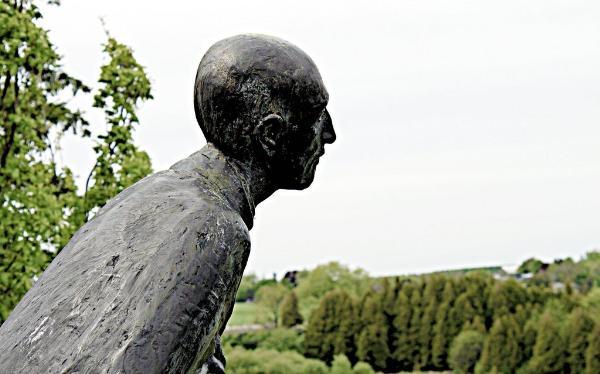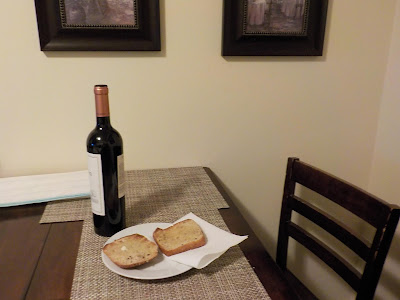 |
| http://www.thinkingfaith.org/sites/default/files/styles/article_full_687/public/field/image/20100730_Ignatius.jpg?itok=MPYtBu1U |
The Prophet Jeremiah prays a lamentation over the consequences of the the guilt of our ancestors.
In the Gospel from Matthew, Jesus separates from the crowd to offer an explanation of the Parable of the Weeds to His disciples.
* [13:37–43] In the explanation of the parable of the weeds emphasis lies on the fearful end of the wicked, whereas the parable itself concentrates on patience with them until judgment time.Tom Shanahan, S.J. shares that Ignatius of Loyola knew that he was a loved sinner. That filled him with such gratitude that he desired with all his being to know, love and serve the one who loved him so mercifully. And, once his heart was on fire with a passionate desire to be with Jesus, he came to a spiritual freedom that was quite powerful, liberating him to serve others with all his heart.
Wouldn't it be wonderful if each of us could ask for the grace to experience ourselves as a loved sinner today? No matter what we've ever done, ever failed to do? Wouldn't it be wonderful if we could ask for the courage to name the various desires in our hearts today? To name quite unattractive desires, that perhaps function to shape how we treat others? To name quite loving or heroic desires, that perhaps rarely get attention? What a great tribute to Ignatius of Loyola, and what glory and praise to our Lord and Savior, if throughout the world today, we would ask for the freedom to know and act upon those desires within us that are from God, and the freedom and peace to let go of those that are not! And what power there would be if all of us today were to become more aware of the opportunities for intimate closeness with our loving God, in the midst of whatever stretches us, embarrasses us, in whatever is our day to day duty or routine! "Lord, I know you are with me, in this place, forgiving me, encouraging me, inspiring me. Thank you." And, finally, what wondrous love would flow from our hearts, to the ends of the earth, if we all asked to be with Jesus, in being for and with others!To celebrate the Feast of St Ignatius of Loyola, founder of the Society of Jesus, James Hanvey SJ exposes the theological vision manifested in the Spiritual Exercises and in Ignatius’s life.
The Exercises, and indeed the whole example of Ignatius’s life, certainly expect the subject to spare nothing in the service of God and his Kingdom, but this flows from an inexhaustible gratitude for what one has received from the Divine Majesty at such cost. The determined ordering of all one’s energies in the service of Christ, and the desire to participate as completely as possible in the work of salvation require a disciplined asceticism of love for God and for neighbour, but this ‘freedom’ is far from the indifference of a stoic self-mastery, though it may teeter on the brink of this distortion.Don Schwager echoes the conclusion of Jesus explanation of the Parable of the Weeds (Matthew 13.43) as he quotes Origen of Alexandria (185-254 AD) encouragement to become friends of Jesus.
"Now, having discoursed sufficiently to the multitudes in parables, he sends them away and goes to his own house, where his disciples come to him. His disciples did not go with those he sent away. As many as are more genuine hearers of Jesus first follow him, then having inquired about his house, are permitted to see it. Having come, they saw and stayed with him for all that day, and perhaps some of them even longer. In my opinion, such things are implied in the Gospel according to John... And if then, unlike the multitudes whom he sends away, we wish to hear Jesus and go to the house and receive something better than the multitudes did, let us become friends of Jesus, so that as his disciples come, we may also come to him when he goes into the house. And having come, let us inquire about the explanation of the parable, whether of the tares of the field, or of any other. (excerpt from the COMMENTARY ON MATTHEW 10.1–3)The Word Among Us meditation on Jeremiah 14:17-22 for the Memorial of Saint Ignatius of Loyola, Priest, comments that if we look around, we can see at least as many problems today as existed in Jeremiah’s time. In fact, if we think about it long enough, we may also be moved to tears. What of all the pain caused by abortion, drug addiction, and domestic violence? What of the poor who live in unimaginable squalor? As God’s people, we must surely empathize with all of the sadness, loss, and suffering.
But our response doesn’t have to end there. In fact, it would be unchristian to let it stay there. Many critics of religion point to suffering as a reason not to believe in God, but we can say exactly the opposite. God’s will is not to cause suffering but to stop it. That’s why he sent his Son! Jesus came to free us from sin and to give us the “ministry of reconciliation” (2 Corinthians 5:18). He came to bring heaven down to earth, and he now calls all of us to build that kingdom here and now.Friar Jude Winkler explores the lamentation of Jeremiah and its connection to the Love of God for His people and personal consequence for the prophet. Matthew’s Gospel continues to assert that we will face a time of accounting. Friar Jude examines the role of the presence of evil as an invitation to conversion and to fight the Evil One.
Fr. Richard Rohr, OFM, shares some key reasons that the Center for Action and Contemplation is dedicated to reinvigorating the teaching of Christian contemplation. The consistent practice of contemplation helps to uncover our essential Self, our connected Self, our True Self.
Unfortunately, separateness is the chosen stance of the small self which has a hard time living in unity and love with the One, Ultimate Reality, and the diverse manifestations of this Reality (i.e., ourselves, other people, and everything else). The small self takes one side or the other in order to feel secure. It frames reality in a binary way: for me or against me, totally right or totally wrong, my group’s opinion or another group’s—all dualistic formulations.For most of us, this objective divine image has not yet become the subjective likeness (Genesis 1:26-27). Our life’s goal is to illustrate both the image and the likeness of God by living in conscious loving union with God. It is a moment by moment choice and surrender.
References
(n.d.). Jeremiah, chapter 14 - United States Conference of Catholic Bishops. Retrieved July 31, 2018, from http://www.usccb.org/bible/jeremiah/14:17
(n.d.). Matthew, chapter 13 - United States Conference of Catholic Bishops. Retrieved July 31, 2018, from http://www.usccb.org/bible/matthew/13
(n.d.). Creighton U Daily Reflections .... Retrieved July 31, 2018, from http://onlineministries.creighton.edu/CollaborativeMinistry/daily.html
(2010, July 30). Ignatius of Loyola: Theology as a way of living | Thinking Faith: The .... Retrieved July 31, 2018, from http://www.thinkingfaith.org/articles/20100730_1.htm
(n.d.). Daily Scripture Readings and Meditations. Retrieved July 31, 2018, from http://dailyscripture.servantsoftheword.org/
(n.d.). Saint Ignatius of Loyola, Priest (Memorial) - Mass Readings and .... Retrieved July 31, 2018, from https://wau.org/meditations/
(n.d.). Daily Meditations Archives - Center for Action and Contemplation. Retrieved July 31, 2018, from https://cac.org/category/daily-meditations/





